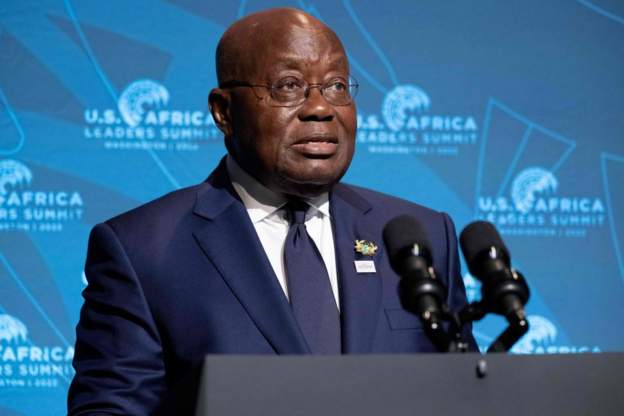
Ghana concerned about activities of Russian mercenaries at Burkina border
President Nana Addo Dankwa Akufo-Addo has expressed concerns about Russian mercenaries' activities on Ghana's northern border with Burkina Faso.
President-Akufo-Addo who is in Washington for the US-Africa Leaders Summit raised the concerns at a meeting on Wednesday (December 14, 2022) with United States Secretary of State, Antony Blinken. This was contained in a statement released by the U.S. Department of State.
Advertisement
According to the President, Burkina Faso (Ghana's neighbour to the north) had given Russian mercenaries working for the Wagner Group a mine as payment for their services.
"And I think that beyond everything, there is a matter that I want to urge upon you. Today, Russian mercenaries are on our northern border," President Akufo-Addo said.
"Burkina Faso has now entered into an arrangement to go along with Mali in employing the Wagner forces there. I believe a mine in southern Burkina has been allocated to them as a form of payment for their services. Prime minister of Burkina Faso in the last 10 days has been in Moscow. And to have them operating on our northern border is particularly distressing for us in Ghana".
How was the Wagner Group started?
A BBC investigation into the Wagner Group highlighted the believed involvement of a 51-year-old former Russian army officer, Dmitri Utkin. He is thought to have founded Wagner and given it its name - his own former call-sign.
He is a veteran of the Chechen wars, a former special forces officer and a lieutenant colonel with the GRU, Russia's military intelligence service.
The Wagner Group first went into action during Russia's annexation of Crimea in 2014.
Some suggest Russia's military intelligence agency, the GRU, secretly funds and oversees the Wagner Group.
Mercenary sources have told the BBC that its training base in Mol'kino in southern Russia is next to a Russian army base.
Russia has consistently denied that Wagner has any connection with the state.
The President said he was particularly concerned about the activities of the Russian mercenaries because of Ghana's very vocal condemnation of Russia's invasion of Ukraine.
He added: "Apart from not accepting the idea of great powers once again making Africa their theatre of operation, we have a particular position that you know about over the Ukraine war, where we have been very, very vocal and upfront about condemning the invasion of Russia – by Russia. And therefore, there now to have this group in our borders is a matter of some considerable disquiet and concern for us. We’d really like to have a privileged opportunity to talk about its implications and what we believe ought to be the case".
President Akufo-Addo further urged the US to partner with the Economic Community of West African States (ECOWAS) to protect countries in the region from armed groups that threatened democracy.
He said ECOWAS had been very consistent in refusing to deal with coup makers because of the undemocratic nature of their accession to power.
"This is what took place with the discussion in the Congress yesterday, which I found very fruitful. And I would like to – the themes of that discussion should be the themes that we should continue to address: to what extent we can have you as a partner in confronting these threats," he said.
"It’s very important that ECOWAS and the West African area remains a democratic space. It’s the reason for the actions we took over the coup d’etats in Burkina Faso, in Mali, and in Guinea".
Safeguarding Ghana's democracy
The President said Ghanaians had chosen democracy as means of choosing their governments after experimenting with other systems in the past including a "one-party state".
However, he mentioned that there were "enemies of democracy" working in West Africa and called for further engagement with the US to combat those forces.
"And our people are now very clear in their mind. They want to go down the avenue of democratic engagement, and that is why the last 30 years of the Fourth Republic have been the most stable in our country’s history. We want to do everything to preserve that, but there are enemies of democracy who are working hard in West Africa today. And therefore it’s important that we bring that matter to your notice and see to what extent we can engage you as a reliable partner in the pushback of those forces".
"There are other areas, of course, of great significance too – the cooperation for economic growth and – for the development and for the making of prosperity for our people, which is to some extent part and parcel of the same fight. If the young people have things to do, they’re not going to be recruits for terrorist forces. So all of that is part and parcel, but specifically, what we can do about the terrorist threat in West Africa is now the major security concern of all our states, especially the coastal states that, up till now, till the last six months, have been relatively free of this threat. But now on all our common borders – Benin, Togo, Ghana, Cote D’Ivoire – are these forces that are operating there".




